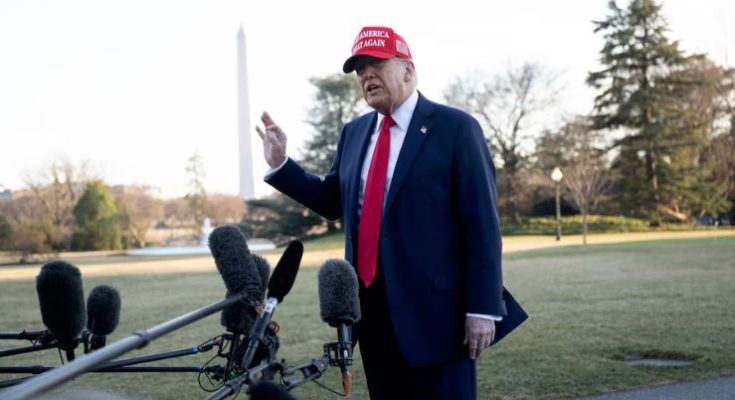But the cost of many of the products on that table have remained stubbornly high in Trump’s first seven weeks in office, while all three major stock market indexes have dropped below their Election Day levels amid concerns about the president’s aggressive tariff policies.
“When people expect you to do one set of things when they vote for you, and then if the news tends to be dominated by another set, it leads to a good deal of disappointment.”
Voters largely put Trump in the White House over frustration with the economy, after Trump and Republicans argued that President Joe Biden’s policies sparked runaway inflation. Trump offered himself as the antidote, pledging to be effective as soon as he took the oath of office. But as his administration passes Day 52, the stock market has taken a dive, prices of many everyday goods have stayed high, and Trump and his allies have encouraged increasingly wary Americans to be patient as he vows to reshape the U.S. economy and boost manufacturing through tariffs on foreign goods.
“That’s a good question,” a White House official replied to The Washington Post this week, when asked how long such a “transition” would go on.
The former veterinary assistant and new mother from Locust, North Carolina, considers herself a feminist whose politics lean left. But she voted for Trump in November, hoping for a better economic outlook. She and her fiancé recently closed on a house and plan to move in this month with their 4-month-old daughter.
Adding to her anxiety are fears that Trump and his Republican Party will cut food stamps and other entitlements, eliminating an option Arney’s family could turn to if things get worse. Her daughter drinks special formula to help with acid reflux.
“It’s $44 a can, and she’s going through seven cans a month,” she said. “I’m worried about being able to feed my baby.”
“Shut Up About Egg Prices,” read the title of an op-ed Trump shared on social media in recent days, cautioning that Trump’s economic goals will take time. The piece by conservative commentator Charlie Kirk touted Trump’s Day 1 executive order to have his economic adviser issue a report by Feb. 19 on how agencies are working to reduce the cost of living — a task the administration has yet to fulfill.
Still, it’s unclear what political cost Trump could pay. Despite polling showing that more than half of Americans disapprove of how Trump is handling the economy, people who voted for Trump in 2024 still give him high marks on it. In a potential warning sign, even a majority of Republicans say they’re concerned tariffs will raise the cost of products they buy, according to a recent Washington Post poll.
Asked Tuesday whether Trump bore any responsibility for the fall in the stock markets, his press secretary, Karoline Leavitt, said he stands by his “commitment to restore American manufacturing and global dominance” through tariffs.
Tom Kristunas, a 65-year-old Trump voter from Tunkhannock, Pennsylvania, said he hasn’t seen grocery prices inch down, but the country is “going in the right direction” with Trump at the helm. He said he didn’t expect to see prices drop this quickly anyway.
“I think it’s going to take a while,” said Kristunas, who retired from Procter & Gamble’s diaper factory in Northeastern Pennsylvania, a part of the state where Trump saw large gains with working-class voters. “It’s not going to happen overnight.”
Many of the president’s supporters have given the same refrain when asked about the economy: Give him time.
“He’s just getting started,” 72-year-old Sandi Fitch said outside a Walmart in Menomonie, Wisconsin.
“Inflation still sucks,” 40-year-old Jon Haag said while shopping at Aldi in nearby Eau Claire. But “Trump’s been in power for, like, two minutes,” he added.
Bill Schroeder, a farmer on the Wisconsin-Minnesota border, conceded Trump’s tariffs may hurt his business in the short run. U.S. farmers get the vast majority of their supply of a key fertilizer ingredient from Canada, and plenty of people are worried about retaliatory tariffs on the cheese, corn and soybeans they export abroad. But Schroeder said he remembers how the first Trump administration gave billions of dollars to farmers who lost income in its trade war.
Azaliya Odarchuk, a 19-year-old in Charlotte, cast her first-ever ballot in November and voted for Trump. She, too, said she hasn’t noticed any change in prices since Biden left office.
Odarchuk said she knows of other young people who don’t like Trump but still voted for him based on the economy. “I saw it on social media,” she said. “They said they were just tired of paying so much for everything.”
Trump ultimately must bring down the cost of goods to deliver on promises that swayed many of his new voters, she said — even if prices go up first and even if a recession takes place.
She disagrees with some of Trump’s positions — largely on foreign policy — but still thinks he will make good on his promise to restore the economy to where it was in his first term.
“I think Trump will get the prices down — I believe that he will,” Odarchuk said. “I don’t know the right way I would have gone about it, but I’m not president.”



